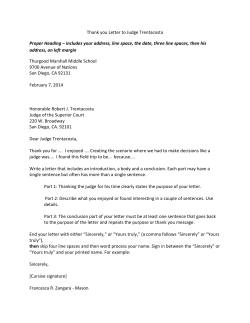
The Sad Case of Richard Lapointe: Update from Robert Perske
The Sad Case of Richard Lapointe: Update from Robert Perske In the Summer 1996 issue of the Newsletter of the Network on Ethics and Intellectual Disability, Robert Perske reported on the case of Richard Lapointe, who at the time was a 46-year-old dishwasher diagnosed with Dandy-Walker syndrome that had caused life-long mental and physical disabilities. He had been sentenced to life without parole plus 60 years after signing three conflicting confessions to the 1987 rape and murder of an 88-year-old woman while claiming he could not remember being at the scene of the crime. The contradictions in the accounts led Robert Perske and other advocates to conclude that events could not have occurred in the manner claimed in the trial. Earlier this year Mr. Perske reported the outcome of new legal proceedings before Judge Stanley T. Fuger in the Superior Court in the Tolland Judicial District in Connecticut that was seeking a new trial on grounds of ineffective legal counsel and suppressed evidence. Like many of you, my mind has experienced a tornado of anguish. Now that it is settling down I want to take my stand regarding the case of Richard Lapointe. Ever since Judge Fuger recently delivered that scathing ruling against Richard Lapointe, my brain has indeed been caught up in an awful anguish. I am appalled that Judge Fuger admitted, on the opening of the trial, that he had not even read the case. I was also appalled that he threw the case out in the middle of the hearing. And on top of that, he ordered the lawyers to never ever bring this case back into the courts again. Like you, I have come to know and care about our soft little, concrete thinking friend with Dandy-Walker Syndrome, with hearing aids and thick glasses who as a kid was nicknamed Mr. Magoo, who only walks and never runs, but still proudly tells me “I survived five shunt operations in my brain.” He has also told me that when taunts and jeers are thrown at him, “It takes a better man to walk away.” Why couldn’t Judge Fuger ponder these facts? Why couldn’t Judge Fuger see that Richard could have never committed that raging athletic murder that included brutal blows to the face, boy-scout-knotted ligatures around the neck and hands, raping He has also told me that when taunts and jeers are thrown at him, “It takes a better man to walk away.” of an old woman with a blunt object, carrying her 160-pound body to another location, burning the handle off a knife, and setting the apartment on fire in three places? Instead, Judge Fuger eluded that our defense lawyers’ case was an offense to the holy writ of Habeas Corpus. But I guess that’s the way technical judges think. So what is left to do now? Thus far, all DNA in Richard’s case that we knew about was used up back in 1990 while the prosecution began to build their case. Even so, our Centurion Ministry lawyer and investigator are continuing to spend time and money and greathearted energy trying to scrape for something that still may have a small speck of readable DNA on it. Steve Drizin, the assistant director of The Center on Wrongful Convictions based at Northwestern University School of Law, claims that it is very tough to get an exoneration without DNA. For example, Connecticut recently and quickly exonerated James Tillman as soon as they discovered game-over DNA. That made it a remarkably easy case. So I anguish that Richard’s case will be so much harder to solve. On the other hand, The Centurions never take a case if they do not believe deeply in their heart that their client is innocent. They have told us that they will keep moving forward. For information about Richard Lapointe’s case see: http://www.friendsofrichardlapointe.com/ The Newsletter of the Network on Ethics and Intellectual Disabilities, Vol. 11, No. 1, Winter 2008
© Copyright 2025











